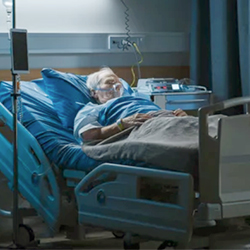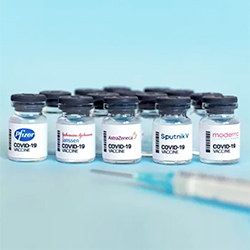By Landon Gray
The FDA approved a new indication for baricitinib (Olumiant, Lilly) for the treatment of hospitalized adult COVID-19 patients who require supplemental oxygen, noninvasive or invasive mechanical ventilation, or extracorporeal membrane oxygenation (ECMO). This is the first COVID-19 immunomodulatory treatment to receive FDA approval.

Also used to treat rheumatoid arthritis, baricitinib was first authorized for emergency use in combination with remdesivir (Veklury, Gilead) in November 2020 for the treatment of hospitalized adult and pediatric COVID-19 patients.
The new indication is based on findings of two phase 3, randomized, double-blind, placebo-controlled trials—ACTT-2 and COV-BARRIER—including the COV-BARRIER addendum. The ACTT-2 trial found patients treated with baricitinib had an average recovery time of seven days (95% CI, 6-8), and a 30% higher chance of improved clinical status at day 15 (odds ratio, 1.3; 95% CI, 1.0-1.6). In the COV-BARRIER trial, researchers found the all-cause mortality rate for patients treated with baricitinib after 60 days was 10% (n=79), compared with 15% (n=116) for the placebo group (hazard ratio, 0.62; 95% CI, 0·47-0·83; P=0.0050).
Researchers from both studies concluded that baricitinib reduced mortality among hospitalized patients with COVID-19, and had a similar safety profile to the already established standard of care.
The recommended dose for treatment of COVID-19 is 4 mg once daily for 14 days or until the patient is discharged from the hospital, whichever may come first. However, use of baricitinib can can increase the risk for serious bacterial, fungal (candidiasis and pneumocystosis), viral and opportunistic infections that could lead to hospitalization or death, including tuberculosis.
In the instances where serious infection occurs, the FDA advises the interruption of baricitinib treatment until the infection is controlled. The FDA also advises against the use of baricitinib for patients with active TB—which could present with pulmonary or extrapulmonary disease—and recommends that health providers “test for latent TB before and during therapy, except for COVID-19; treat latent TB prior to use.” They recommend monitoring all patients for active TB during treatment, even if the patient’s initial tests were negative.
The FDA warns of a risk for thrombosis associated with baricitinib. Increased risk for pulmonary embolism and venous and arterial thrombosis can occur with another Janus kinase inhibitor versus tumor necrosis factor blocker.
Other adverse reactions include malignancy and lymphoproliferative disorders, major adverse cardiovascular events, gastrointestinal perforations, laboratory abnormalities, hypersensitivity, and mortality.
Baricitinib remains under emergency use authorization status for hospitalized pediatric COVID-19 patients ranging from 2 to 18 years of age who require supplemental oxygen, noninvasive or invasive mechanical ventilation, or ECMO.




